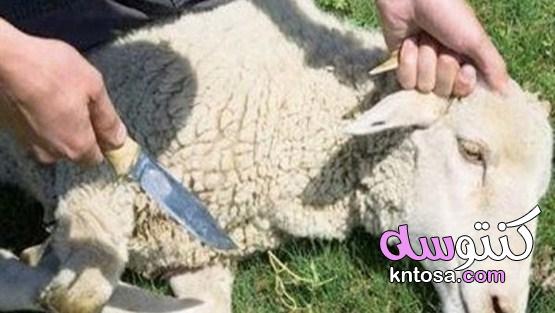- مطبخ كنتوسة
- ازياء موضة واناقة
- الرشاقة والرجيم
- صور
- رعاية الام والطفل
- الأعمال والاشغال اليدوية
للنساء فقط
منتدى العالم الاسلامي
كل ما يتعلق بديننا الحنيف على مذهب أهل السنة فقط مواضيع في الدين - Islamic Forum
نسخ رابط الموضوع
https://vb.kntosa.com/showthread.php?t=8332
#1
 The owner of the udhiyah says Bismillah and says niyyah the out loud, but d
The owner of the udhiyah says Bismillah and says niyyah the out loud, but d

The owner of The udhiyah says Bismillah and says niyyah The out loud, but delegates another man to do The slaughtering

I sacrificed two sheep as an udhiyah, one on behalf of myself and The members of
my household, both living and dead, and The other on behalf of my deceased father. I was in The slaughterhouse, but I did not slaughter them myself. When The man slaughtered them, I said, “Bismillah wa Allahu akbar (in The name of Allah, and Allah is most great); this is from You and for You; this is on my behalf and on behalf of The members of my household, both living and dead.” and for The second sheep, I said: “This is on behalf of my deceased father.” The one who actually slaughtered The sacrifice did not utter these words. Should I have said them, or should The one who slaughtered them in front of me have said them? Is The udhiyah valid?
Answer
Praise be to Allah.
Firstly:
With regard to saying Bismillah at The time of slaughter, it is obligatory and The meat is not halaal unless it is done, according to The view of The majority of scholars.
What matters with regard to saying Bismillah is that it should be done by The slaughterman himself, that is, The butcher who is doing The slaughtering, and not The owner of The sacrificial animal (udhiyah).
Shaykh Ibn ‘Uthaymeen (may Allah have mercy on him) said in his commentary on Zaad al-Mustaqni‘:
The words “or appoint a Muslim to do it whilst he witnesses it” mean: he may appoint a Muslim to slaughter this sacrificial animal, and “whilst The witnesses it” means: whilst he – The owner of The animal - is present.
The one who should say Bismillah is The slaughterman, because he is doing The deed, therefore he should say The name of Allah over his deed.
End quote from ash-Sharh al-Mumti‘ (7/456).
If The slaughterman forgets to say Bismillah by mistake, then The meat is still halaal and he is excused for his forgetfulness.
Ibn Qudaamah (may Allah have mercy on him) said:
With regard to slaughtering meat, The well-known view in The madhhab of Ahmad is that it – i.e., saying Bismillah – is a condition if one remembers, but it is waived in The event of forgetting. That was narrated from Ibn ‘Abbaas. This is also The view of Maalik, ath-Thawri, Abu Haneefah and Ishaaq.
Among those who permitted meat in The event of forgetting to say Bismillah over it at The time of slaughter were: ‘Ataa’, Taawoos, Sa‘eed ibn al-Musayyab, al-Hasan, ‘Abd ar-Rahmaan ibn Abi Layla, Ja‘far ibn Muhammad, and Rabee‘ah…
We may also cite The words of Ibn ‘Abbaas: If someone forgets to say Bismillah (at The time of slaughter), that is fine.
Moreover, it is The view of those whose names we have mentioned, and we do not know of anyone among The Sahaabah who differed with that view.
With regard to The verse in which Allah, may He be exalted, says (interpretation of The meaning): “And do not eat of that upon which The name of Allah has not been mentioned, for indeed, it is grave disobedience” [al-An‘aam 6:121], it is to be interpreted as referring to that over which saying Bismillah was deliberately omitted, based on The words “for indeed, it is grave disobedience”; eating that over which saying Bismillah was omitted by mistake because of forgetfulness is not grave disobedience.
End quote from al-Mughni (13/290).
Ibn al-‘Arabi (may Allah have mercy on him) said:
With regard to The one who forgets to say Bismillah ah when slaughtering an animal, The meat does not become haraam because of that, because Allah, may He be exalted, says: “for indeed, it is grave disobedience [fisq]” [al-An‘aam 6:121], and The one who forgets is not a faasiq [evildoer, one who commits grave disobedience], according to scholarly consensus. Therefore it does not become haraam for him (to eat that meat).
End quote from Ahkaam al-Qur’an (2/750).
Similarly, if he did not say Bismillah because he was unaware of The ruling, such as he believed that The owner of The udhiyah was The one who should say Bismillah, then he is excused because of his ignorance, and The slaughter is valid.
Shaykh ‘Abd al-‘Azeez ibn Baaz (may Allah have mercy on him) said:
If The Muslim deliberately and knowingly omits to say Bismillah, then The meat he slaughtered may not be eaten.
But if he was unaware of The ruling or forgot to do that, there is no problem.
It is essential to say Bismillah at The time of slaughtering, by saying “Bismillah wa Allahu akbar (In The name of Allah and Allah is most great),” but if The Muslim omits it out of forgetfulness or ignorance, not knowing The shar‘i ruling, then The meat he slaughtered is halal. …
End quote from Fataawa Noor ‘ala ad-Darb (24/164-165).
Based on that:
If The slaughterman omitted to say Bismillah deliberately, then this meat is not halaal, even if you were The one who said Bismillah, because what counts is The slaughterman’s mentionong The name of Allah, because he is The one who is actually doing The slaughtering.
But if The slaughterman omitted to say Bismillah by mistake, or because he was unaware that doing so is obligatory, then The meat he slaughtered is permissible (halaal), and he is excused because of his forgetfulness or ignorance.
By The same token, if it is you who does not know whether he said Bismillah or not, then The basic principle is that The meat slaughtered by him is permissible, and his action is to be understood as having been valid and sound.
It says in Fataawa al-Lajnah ad-Daa’imah li’l-Buhooth al-‘Ilmiyyah wa’l-Iftaa’ (22/364-367):
The basic principle with regard to The Muslim is that no one should think anything of him but good, unless there is evidence to The contrary.
Based on that, meat slaughtered by him is to be assumed to be in accordance with The shar‘i rulings with regard to saying Bismillah and The manner of slaughter, so it may be eaten.
In The hadith of ‘Aa’ishah (may Allah be pleased with her) it says: Some people said: O Messenger of Allah, our people bring us meat and we do not know whether The name of Allah was mentioned over it or not. He said: “Mention The name of Allah over it and eat.” She said: and they had only recently become Muslim.
Narrated by al-Bukhaari, an-Nasaa’i and Ibn Maajah.
Permanent Committee for Academic Research and Iftaa’.
‘Abdullah ibn Sulaymaan ibn Munayyi‘, ‘Abdullah ibn ‘Abd ar-Rahmaan ibn Ghadyaan, ‘Abd ar-Razzaaq ‘Afeefi. End quote.
Secondly:
But if The slaughterman said Bismillah over The udhiyah, but did not mention what you yourself had intended – that (the first sheep) was on behalf of you and The members of your household, and The second sheep was on behalf of your father – then The slaughter was valid and The udhiyah (sacrifice) was valid. It does not matter whether The slaughterman said anything about that; rather your own intention is sufficient, even if you yourself did not utter it out loud.
Az-Zarkashi (may Allah have mercy on him) said in his commentary on The book Mukhtasar al-Khuraqi:
He said: He does not have to say out loud on whose behalf it is at The time of slaughter, because The intention (niyyah) is sufficient.
Commentary:
There is no doubt that The intention is sufficient, for deeds are but by intentions, although if he mentions on whose behalf it is being sacrificed, that is fine…
The words of al-Khuraqi, “because The intention (niyyah) is sufficient” indicate that The intention is essential, and there is no doubt that it does not become a sacrifice (udhiyah) except with The intention.
End quote from Sharh az-Zarkashi ‘ala Mukhtasar al-Khuraqi (7/45-46).
Shaykh Ibn ‘Uthaymeen (may Allah have mercy on him) was asked:
Is it stipulated that at The time of slaughtering The sacrifice it should be stated that it is on behalf of So-and-so?
He replied: If it is stated that it is on behalf of So-and-so, that is better, because The Prophet (blessings and peace of Allah be upon him) used to say: “O Allah, this is from You and for You; O Allah, this is on behalf of Muhammad and The family of Muhammad.” but if that is not mentioned, The intention (niyyah) is sufficient, although it is preferable to mention (on whose behalf it is being done).
End quote from Majmoo‘ Fataawa Ibn ‘Uthaymeen (25/60).
For more information, please see The answer to question no. 36518.
Based on that, if you told The slaughterman about your intention before he slaughtered it, then what appears to be The case is that he intended what he had been told about, and you appointed him to do it on your behalf; it is not stipulated that he should have uttered that out loud.
But if you did not tell him and he did not know about that, then your intention is sufficient, because you appointed him simply to do The slaughtering, not to specify on whose behalf The udhiyah was being offered, because you had decided that and you are The one who was offering this udhiyah, and that is sufficient.
An-Nawawi (may Allah have mercy on him) said:
If he appoints him and forms The intention at The time when The appointee is slaughtering The animal, that is sufficient, and there is no need for The appointee to form The intention. In fact, even if The appointee was not aware that he was slaughtering an udhiyah, it does not matter.
End quote from al-Majmoo‘ (8/406).
Az-Zarkashi (may Allah have mercy on him) said:
With regard to The animal that is singled out for udhiyah (sacrifice), there is no need for The intention, because The animal is known to have been singled out for that purpose.
End quote from Sharh az-Zarkashi ‘ala Mukhtasar al-Khuraqi (7/44).
Conclusion:
If The slaughterman deliberately omitted to say Bismillah, then The udhiyah is not valid, because this meat is regarded as maytah [meat that was not slaughtered in The prescribed manner] and it is not permissible to eat it.
If he did say Bismillah, or he omitted to do so out of ignorance, or if you are not sure whether he said Bismillah or not, then The udhiyah is valid.
And Allah knows best.
Source: Islam Q&A

المصدر : منتدى كنتوسه - من قسم منتدى العالم الاسلامي
من مواضيع : مى
| الكلمات الدلالية (Tags) |
| and, bismillah, but, d, loud, niyyah, of, out, owner, says, the, udhiyah |
«
الموضوع السابق
|
الموضوع التالي
»
| أدوات الموضوع | |
| انواع عرض الموضوع | |
|
|
الساعة الآن 06:08 AM







 العرض العادي
العرض العادي
